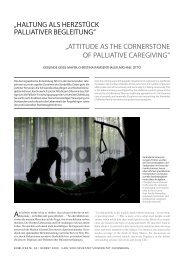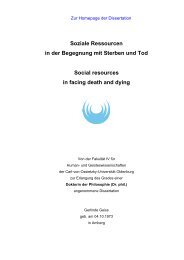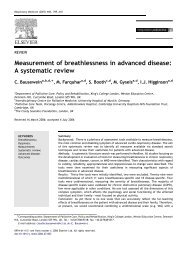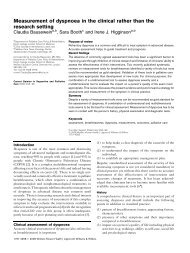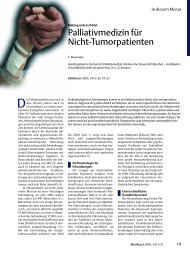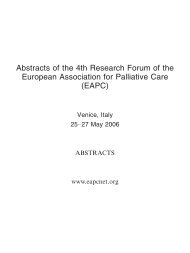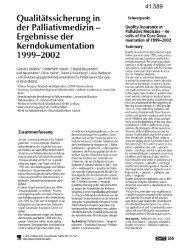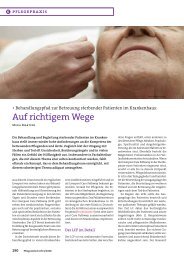EAPC - ipac
EAPC - ipac
EAPC - ipac
Create successful ePaper yourself
Turn your PDF publications into a flip-book with our unique Google optimized e-Paper software.
434 <strong>EAPC</strong> Abstracts<br />
116 Invited Lecture<br />
EU Funded Research Projects and Collaboratives<br />
OPCARE Optimising Cancer Patient Care<br />
Presenting author of different from first author:<br />
Authors: John Ellershaw Marie Curie Hospice Liverpool Marie Curie<br />
Palliative Care Institute Liverpool UNITED KINGDOM<br />
Through the extension of an existing collaboration of colleagues working in<br />
end of life care across Europe and beyond, the 3 year project aims to<br />
explore, share and collate current knowledge and practice in each of the key<br />
themes identified within the work programme: Signs and symptoms of<br />
approaching death; End of life decisions; Complementary comfort care;<br />
Psychological and Psychosocial support to patients, families and caretakers;<br />
Voluntary Service; with the specific aim of improving care for cancer<br />
patients in the last days of life. It aims to reach consensus on the optimum<br />
care to be delivered in this phase, to identify gaps in the knowledge and<br />
develop innovative research protocols to address those gaps and to make<br />
recommendations for the further development of the Liverpool Care<br />
Pathway for the Dying Patient (LCP) Framework in an international context.<br />
Methodologies: Within the 5 domains the following will be undertaken:<br />
– A systematic review of the published and unpublished literature; – An<br />
adapted Delphi Method to identify and evaluate current clinical approaches.<br />
A series of 7, 3 day colloquiums are planned to facilitate further discussion<br />
and sharing of findings, including one workshop of external ‘experts’<br />
and a final international conference. Dissemination: The outputs of this<br />
project will be of interest to patients and carers, healthcare professionals<br />
and organisations, researchers, providers of education and national and<br />
international policy makers. A variety of media will be used to disseminate<br />
the findings: – Publications in peer reviewed journals, conferences, workshops,<br />
seminars, symposiums. The diversity of country of origin of the 9<br />
partners will ensure exposure of the findings in national and international<br />
forums. It is envisaged that the current collaboration will continue to work<br />
together to undertake research projects identified by this work.<br />
117 Invited Lecture<br />
EU Funded Research Projects And Collaboratives<br />
PRISMA reflecting the positive diversities of European priorities<br />
for research and measurement in end of life care<br />
Authors: Richard Harding Palliative Care and Policy King’s College<br />
London UNITED KINDDOM<br />
Barbara Gomes King’s College London London UNITED KINDDOM<br />
Marjolein Gysels King’s College London London UNITED KINDDOM<br />
Stein Kaasa St. Olavs Hospital, Palliative Medicine Unit Trondheim<br />
NORWAY<br />
Claudia Bausewein King’s College London London UNITED KINDDOM<br />
P Lopes Ferreira King’s College London London UNITED KINDDOM<br />
Luc Deliens Vrije Universiteit Amsterdam-VUMC Amsterdam NETHERLANDS<br />
N Derycke Vrije Universiteit Amsterdam-VUMC Amsterdam NETHERLANDS<br />
Irene Higginson King’s College London London UNITED KINDDOM<br />
Background: There is a lack of co-ordination for collaborative international<br />
high quality research in end of life cancer care. Main reasons include: a<br />
lack of agreement on what constitutes end of life cancer care across Europe,<br />
lack of information on public or clinical priorities for research in Europe to<br />
help funders prioritise, and variations in measurement limiting systematic<br />
reviews, original studies and quality measurements. Aims: “PRISMA” aims<br />
to inform best practice and harmonise research in end of life care for cancer<br />
patients across Europe through comparison and exchange of approaches<br />
and experiences of measurement and research priorities. Objectives: The<br />
work packages will undertake actions to identify cultural differences defining<br />
and shaping end of life care, establish public and clinical priorities, and<br />
draw out current best practice in research and resources in both research and<br />
quality measurements. It will use as a model experiences with outcome<br />
measures currently being by researchers and clinicians in EU and African<br />
countries. By co-ordinating the use of measurement and research practices<br />
in end of life care research across Europe there will be a platform from<br />
which future research can be launched. The value of incorporating wide<br />
public and clinical consultation into the programme is to identify key priorities,<br />
in a field where the need for research is great. The programme will<br />
develop web based resources providing information on best practice for<br />
research measurement and quality improvement and facilitate a long lasting<br />
EU collaborative on end of life cancer care. 11 partners in 8 EC countries,<br />
plus involvement from a Pan-African partner, are participating.<br />
118 Invited Lecture<br />
EU Funded Research Projects And Collaboratives<br />
Best practices in palliative care in Europe<br />
Authors: Kris Vissers The Radboud University Nijmegen Medical Centre<br />
NETHERLANDS<br />
In cooperation with institutes in seven European countries, an international<br />
study takes place in order to describe ‘best practices in palliative care’ in<br />
Europe. The project is financed by PHEA (Public Health programme of the<br />
EU). The project is coordinated by Kris Vissers (Netherlands). Partners are<br />
from the Netherlands, Belgium (Johan Menten), UK (Sam Ahmedzai),<br />
Spain (Xavier Gomez-Batiste), Germany (Eberhard Klaschik), France<br />
(Jean-Marc Mollard) and Poland (Wojciech Leppert). The project runs<br />
from October 2007 till October 2010. Although several European countries<br />
have national initiatives regarding best practices for palliative care, attention<br />
to the early initiation of palliative care and the adoption of an integrated<br />
approach is largely lacking. International differences also exist in health<br />
care organisation, moral attitudes towards palliative care, expectations,<br />
services, terminology, treatment, perceptions, legal embedding and funding<br />
of the care (Higginson, 2005). The availability of quality of palliative<br />
care indicators and assessment instruments will help patients, family caregivers,<br />
care providers, policy makers and ministries of health to evaluate<br />
the care provided. An internationally valid, reliable and feasible set of indicators<br />
and assessment instruments are also needed to describe, compare<br />
and improve the palliative care available in Europe and strive towards ‘best<br />
practices in palliative care.’ Objectives: 1) to describe the different models<br />
for the delivery of palliative care in the participating European countries;<br />
2) to make an inventory of those multidisciplinary guidelines and indicators<br />
concerned with the early initiation of palliative care and adoption of an<br />
integrated approach to the delivery of palliative care; 3) to establish a set<br />
of quality indicators for the early initiation and integrated delivery of<br />
palliative care for subsequent validation in an international consensus procedure<br />
(written Rand-Delphi procedure) involving patients, family caregivers,<br />
clinicians and payers/insurers (i.e. identification of a core set of<br />
indicators common to all of the participating countries and countryspecific<br />
indicators); and 4) to identify best practices with regard to the<br />
early initiation and integrated delivery of palliative care using the core set<br />
of indicators. Methods: literature review, qualitative study, modified Rand<br />
Delphi procedure, practice test.<br />
119 Invited Lecture<br />
EU Funded Research Projects And Collaboratives<br />
Normolife Development of new therapeutic substances and<br />
strategies for treatment of pain in patients with advanced<br />
stages of cancer<br />
Authors: Andrzej Lipkowski Medical Research Centre, Polish Acadmy of<br />
Science POLAND<br />
Prolonging life expectation of patients with advanced cancer could be done<br />
by modern medicine. However, progressive pain that is associated with progression<br />
of the disease is a major factor that destructs last moments of life.<br />
Currently, severe and uncontrolled pain is a major reason of requesting<br />
euthanasia. Application of oral pills (morphine) or transdermal patches<br />
(fentanyl) with lipophylic analgesic drugs is the most common treatment of<br />
cancer pain. These compounds penetrating into central nervous system produce<br />
side effects (respiratory depression, constipation, tolerance, sedation,<br />
etc) to such extend that pain treatment is reduced by doctors or refused by



